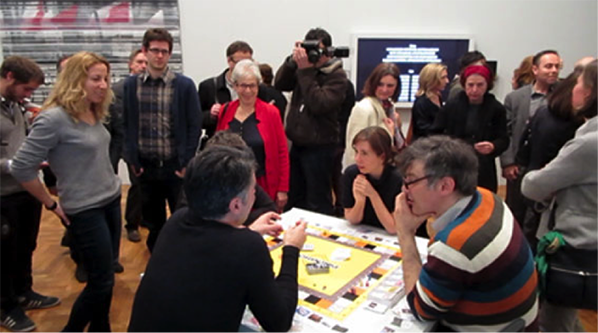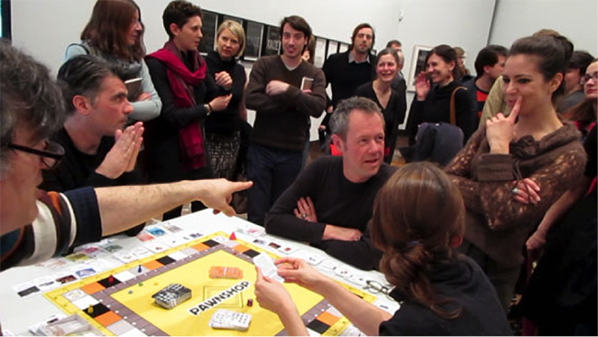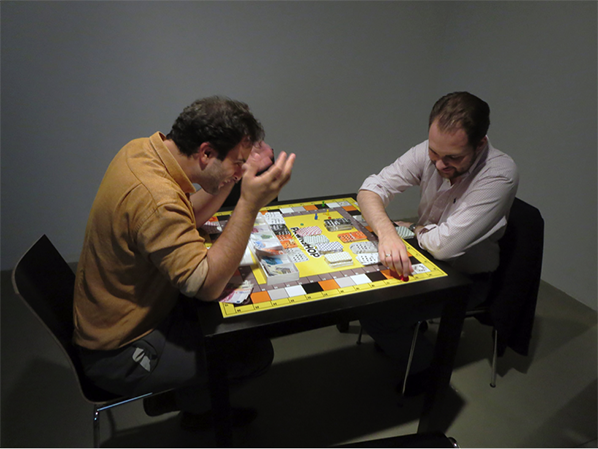



What is the relationship between state corruption and economic collapse in Greece?
Lina Theodorou, artist and creator of the board game ‘Pawnshop- Days of Mistrust’, talks with Furtherfield’s Ruth Catlow about Grexit, Brexit and crisis in Europe.
I met Lina Theodorou, the artist and creator of Pawnshop, in her apartment on a sunny Sunday morning in Berlin. It was just one week after the UK referendum resulted in a vote to leave the EU. I was in Berlin to take part in an event called Art, Money & Self Organization in Digital Capitalism, the first in a series of events called Arts and Commons, organised by Supermarkt.
Theodorou and I quickly got onto the topic of Brexit. We compared notes. She wondered if, like Greece, the UK government would choose to ignore the result of the referendum, fail to invoke Article 50, and stay in Europe after all. That possibility had not occurred to me. She talked about her memories surrounding the Grexit debate- the distress, the uncertainty, the shocking hatred and hostility expressed between family members and people previously considered friends. I had been deeply shaken by the upsurge of street-level racism on the streets of Britain.
Pawnshop, the artwork that is also a board game, was set up for play, laid out on a table in her studio. It is an inversion of Monopoly: the same square board, the pieces, the bank, the cards, the dice. However in this game the player starts the game with no money, only property – jewelery, a bouzouki, antique furniture, a flat- and pays a European tax of €1500 when they pass Go (if they get that far).

Players proceed around the board, according to the luck of the dice, along a path strewn with dilemmas. A second row of squares is used to keep track of the time spent dealing with the consequences of their choices- jail sentences, or hospitalizations for example. As they move around the board, they pick one of the cards, depending on their landing square, and must choose how they will respond to the given dilemmas.
Theodorou tells me that the game is based entirely in fact. For years she has collected newspaper stories in Greece. And here they are gathered in four categories of cards – Dilemma, Involvement, Debt and Luck- to encapsulate the experience of daily life, for everyone, in modern day Greece. ”If you are honest you lose” she says.
On her website are photos of engrossed players at Bozar, Center for fine arts, Brussels; at the exhibition TWISTING C(R)ASH; at Bâtiment d’Art Contemporain « Le Commun » in Geneva; and at the exhibition It’s Money Jim, but not as we know it, at Mario Mauroner Contemporary Art Vienna, and As Rights Go By, Museumsquartier, Vienna. She says it’s important that at the beginning players laugh… but because of ”synesthesia”, the longer they play, the more uncomfortable they become, they feel the ethical discomfort in their bodies.


Theodorou and I digress again, coming back to the Europe question. Because I’m in Berlin I think about Germany’s role. Germany at the heart of Europe is perhaps more part of the problem than they realise. The style of bureaucracy is molded to reflect the German mentality and their industrial system.This is coupled with a confidence in the correctness of the system – that Theodorou points out, is accompanied by the Northern European, Calvinist attitude – anyone who does not comply is wrong and must be punished. “But what is good for Germany is not necessarily what is good for Greece” she says. In Greece for many years the economy was made up of many small entrepreneurs, small businesses, shops, and a community focus” Why must we suddenly give this up in favour of big business. “Why do you have to destroy something that is healthy?”After the banking crisis in 2008 pawnshops started popping up on every street in every town in Greece.
Theodorou tells me that Pawnshop is the Greek reality board game.
“Your father is sick, do you pay his hospital bill?
Yes: pay €3000 and he lives for another 6 years,
No: unfortunately he dies, but you receive a life insurance pay out of €75,000”
Picking an ‘Involvement’ card means that that player’s decision will have consequences for other people too; Debt (is the biggest pile of cards).

Gentrification strategies have failed in Athens. Back in 2006 the rich Greeks, many of whom were also art collectors, started to organise the large scale art events, (in which of course the artists worked for free), but it didn’t take. Then in 2008 the banks collapsed, the economy became surreal, but somehow, Athens remained the same. Perhaps this because regeneration does not have the ever-rising bubble of property prices to support its economy. In Greece everyday people do not speculate on the housing market (as we do in the UK). Rather a house is something you keep for ever in the family.
Theodorou describes the real world Greek tax system as “insane”. It changes every 3 months, Even the accountants have difficulty keeping up with the laws. This alone forces many people into the black market. Then the web of bureaucracy protects the hierarchical status quo and people in higher positions hold onto their power by putting obstacles in the way of others.
The only way to win this game (on the board and IRL in Greece) is with good luck. Good luck is the only way to avoid ethical discomfort or financial ruin.
The Luck cards (also based on fact as reported by the newspapers) are hilarious. “A politician hits you with her car, but fortunately the accident is witnessed by the media – collect €2500”.
“Some rich ladies wish you a Merry Christmas and hand you €100”.
Apparently Athens newspapers have reported tales, for the last few years, in which “ladies” have distributed money to “the poor” from black windowed limousines.

Pawnshop is a polemic on corruption. Small corruption. Long standing, Greek-style, everyday corruption from which no-one can escape. The universal, forced collusion in corruption, and its corrupting effect on the spirit of Greek citizens and society, is set out in the game mechanics. The playful and social medium of the game means that the impact of contemporary Neoliberal politics on the Greek ‘everyman’ is made legible, feelable and discussable: unending, ethical traps; the impossibility of old-style moral political clarity; the flushing of righteous action, solidarity, resistance or even survival. Corruption all the way up and down.
I question Theodorou carefully, because I have long been suspicious of the narrative that says that corruption is the cause of Greece’s economic problems. But the corruption is a fact. While it is not necessarily the only or even the primary cause of its economic distress – which is very very real- the lack of trust in the state is debilitating and has a stagnating effect on the economy.
Pawnshop sits in an honourable tradition of artist’s activist games: to change mindsets and attitudes by actively implicating players in a reconstruction of values – see Mary Flanagan persuasive research about crticial play and the many attitude-hacking games coming out of her lab Titlfactor. Also Brenda Romero’s chilling Train game, Yoko Ono’s Play it by Trust. And for games that train for resistance and solidarity in games such as Escape from Woomera, Debord’s Game of War, and my own pacifist chess hack, Three Player Chess.

A look around Theodorous portfolios of works reveals a long practice that crosses agitprop, video, installations, and networked pieces.
The work all builds on close observations of contemporary political and social systems. Through graphical exuberance and humour these observations are rendered just (barely) bearable so that we are able to spend time with complex, difficult situations and suspend our certainties. And this is necessary and important. We need to face the complexities and ethical contradictions of contemporary politics. There’s no time to lose.
Before the referendum, I found myself uneasy about actually campaigning for “Remain” in spite of my desire for a pan-European peoples’ alliance. This was because I couldn’t ally myself with the dominating political arguments proposed by the Conservative party (and backed up by big-business and the establishment). I also didn’t want to participate in a binary campaign that stamped on the dignity of the layer of people in the UK who are already so disenfranchised by the effects of austerity cuts (and many years of other systemic injustices). This moment revealed for me, and for many others in the ‘social liberal’ layer, a chasm between my own values and experience and those who voted to ‘Leave’. And a desire to find a way to connect. PostBrexit the reality board game may be just the thing we need to help us come together and play our way through the effects, consequences and possibilities.